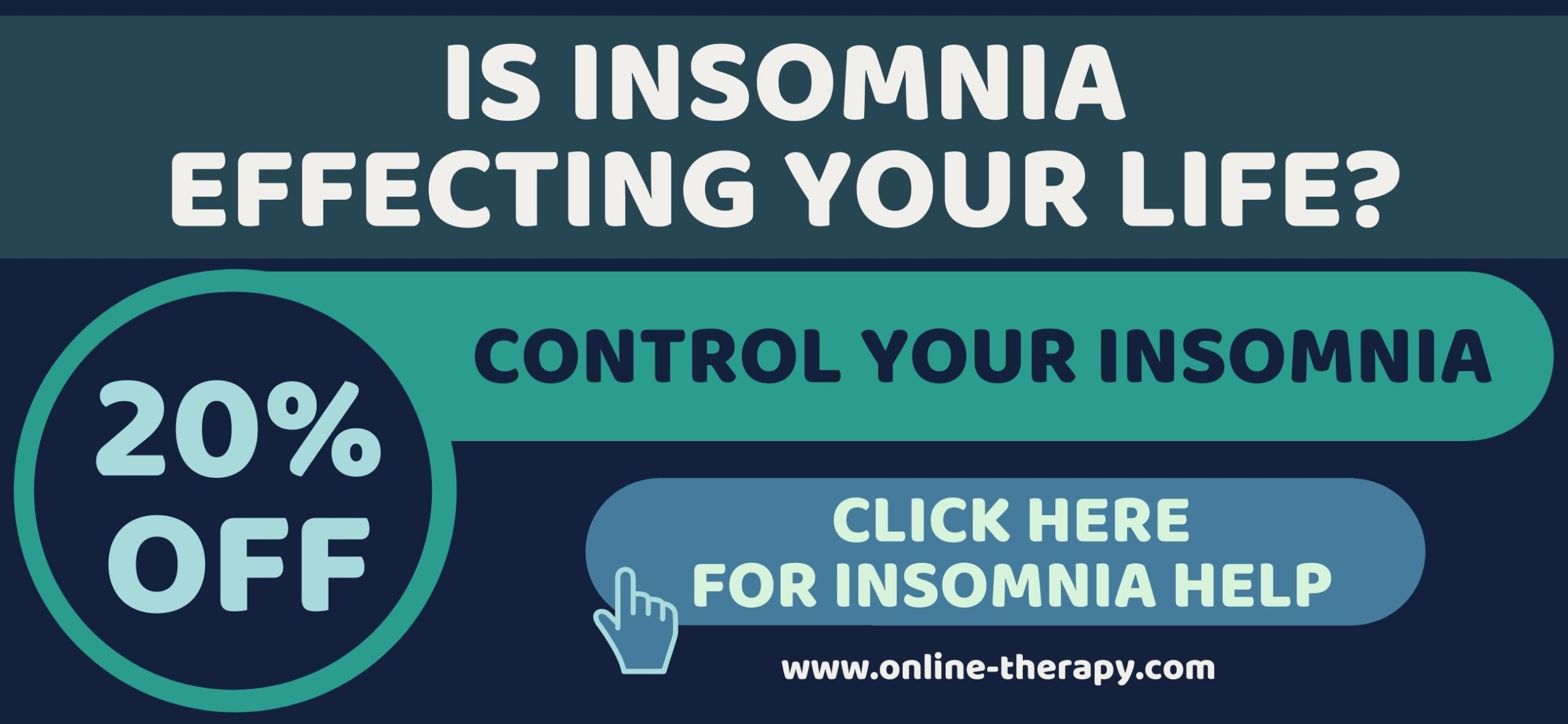What is a Good Substitute For Caffeine?
WhatToGetMy Instructional Article
If you’ve wondered what is a good substitute for caffeine, we have interesting choices to present. It’s not that we don’t like coffee (or tea). On the contrary, we love coffee! However, too much caffeine isn’t good for you at all. A healthy lifestyle is about moderation, so we want to give you information on cutting down caffeine and finding new resources for energy.
Caffeine doesn’t actually provide your body with true energy. It just gives you a fake rush by encouraging the release of adrenaline and cortisol. Once the hormones’ levels drop, you feel the need for an additional boost and strive for more caffeine. That’s how dependence on caffeine is created, so it’s a good idea to replace caffeine from the start.
Before we get further down the article, we’d just like to clear some things up.
- When you lack energy (physically), you probably have low levels of adenosine triphosphate (ATP) in your body. ATP is a usable form of energy that comes from the food we eat, so the solution to boosting energy is to maintain a healthy diet.
- Energy drinks function in the same way as coffee. They are loaded with caffeine and sugar, so you experience a “sugar/energy rush”. Once the adrenaline and cortisol levels drop, you’ll feel the lack of energy you had before.
- If you lack energy but you already had lunch/ate a snack, you might lack mental energy and motivation. You need to find mental boosts to study or to exercise, so check out our articles on these topics for more information.
- One more note. Although hot drinks without caffeine are healthy and good for you, one occasional cup of coffee isn’t a bad thing. In fact, coffee has its benefits from a faster metabolism to reduced dementia risk. However, having a lot of coffee/energy drinks can lead to caffeine overdose. The most common symptoms are nausea and muscle tension while more serious symptoms are vomiting, rapid breathing, and shock state.
Living Caffeine-Free
There are a lot of benefits to living a caffeine-free life. Some people that cut caffeine down noticed different changes. For example:
Feeling less anxious
 Caffeine increases adrenaline levels and puts your body in “fight mode”. This can cause anxiety, nervousness, and heart palpitations. People who are already prone to anxiety noticed that their symptoms got worse with increased caffeine intake. Naturally, when you cut down on caffeine, you’ll feel more relaxed.
Caffeine increases adrenaline levels and puts your body in “fight mode”. This can cause anxiety, nervousness, and heart palpitations. People who are already prone to anxiety noticed that their symptoms got worse with increased caffeine intake. Naturally, when you cut down on caffeine, you’ll feel more relaxed.
Sleeping better
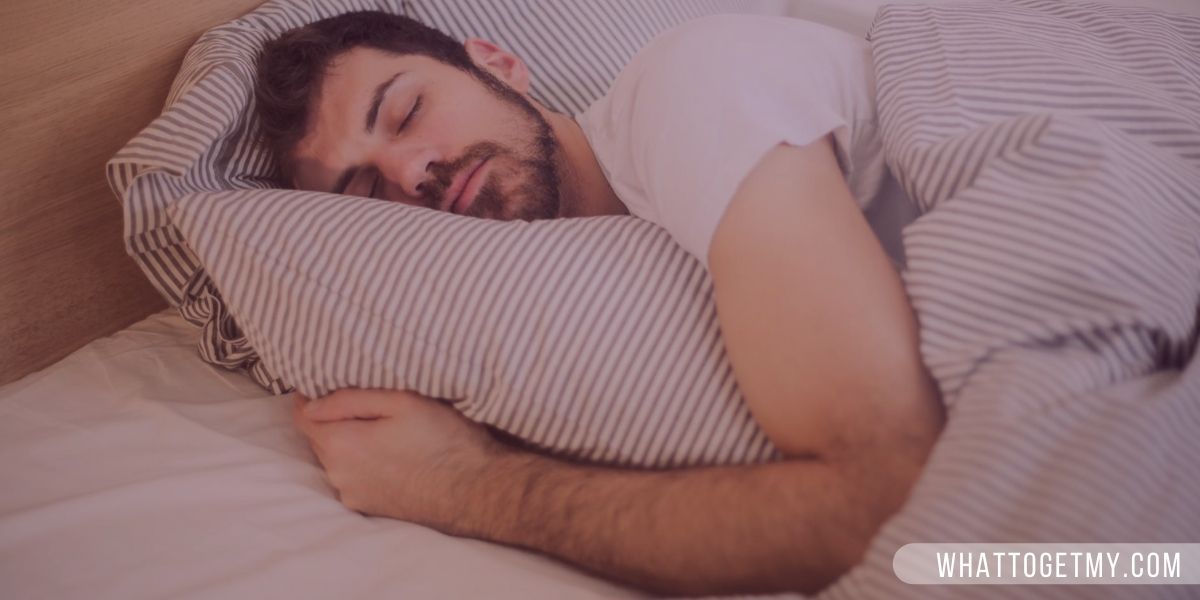 Caffeine is affecting your sleep cycle. A large intake of caffeine can cause daytime drowsiness, restless sleep, and even insomnia. If you’re having trouble sleeping, it would be wise to stay away from caffeine (or at least don’t consume it 6 hours before your head to bed). It’s the same if you’re struggling to wake up in the morning. Before you get to your morning dose of caffeine, try different wake-up methods.
Caffeine is affecting your sleep cycle. A large intake of caffeine can cause daytime drowsiness, restless sleep, and even insomnia. If you’re having trouble sleeping, it would be wise to stay away from caffeine (or at least don’t consume it 6 hours before your head to bed). It’s the same if you’re struggling to wake up in the morning. Before you get to your morning dose of caffeine, try different wake-up methods.
White teeth
 Caffeine drinks such as coffee and tea stain your teeth due to the large levels of tannins they contain. Tannins are organic substances found in plants that give tea its color. The only way to keep your teeth healthy is to brush your teeth or rinse your mouth after consumption. You can also give up caffeinated drinks altogether.
Caffeine drinks such as coffee and tea stain your teeth due to the large levels of tannins they contain. Tannins are organic substances found in plants that give tea its color. The only way to keep your teeth healthy is to brush your teeth or rinse your mouth after consumption. You can also give up caffeinated drinks altogether.
Lower blood pressure
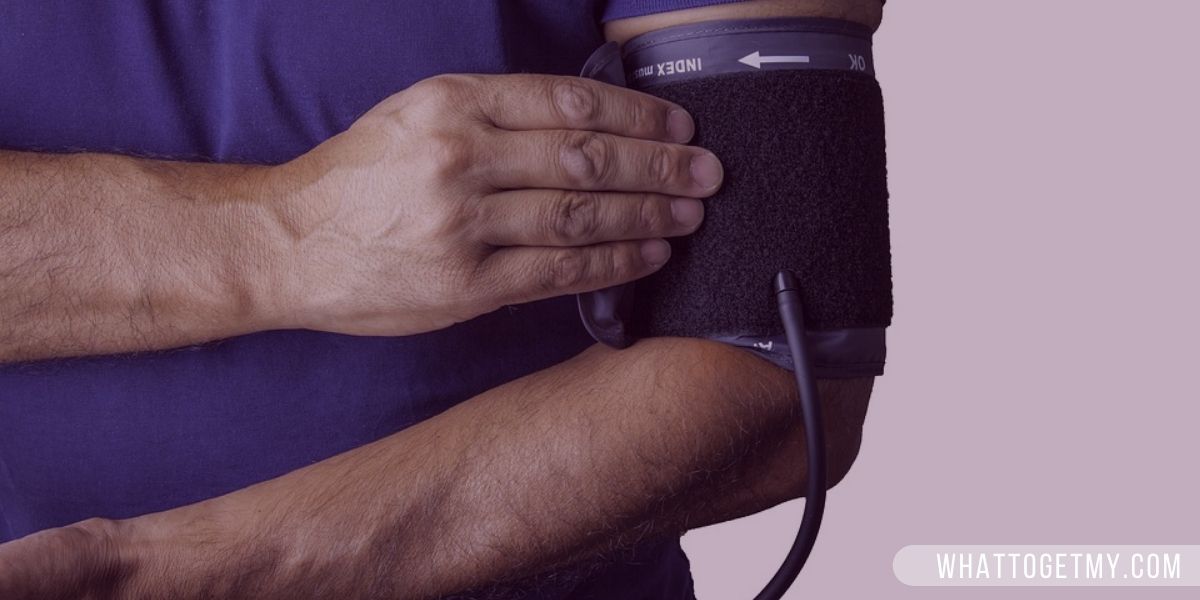 Consuming caffeine raises blood pressure because caffeine has stimulating effects on the nervous system. Also, a high intake of caffeine (3-5 cups per day) can increase the risk of cardiovascular disease. If you’re already having problems with high blood pressure, you shouldn’t add more fuel by consuming a lot of caffeine.
Consuming caffeine raises blood pressure because caffeine has stimulating effects on the nervous system. Also, a high intake of caffeine (3-5 cups per day) can increase the risk of cardiovascular disease. If you’re already having problems with high blood pressure, you shouldn’t add more fuel by consuming a lot of caffeine.
Mood changes
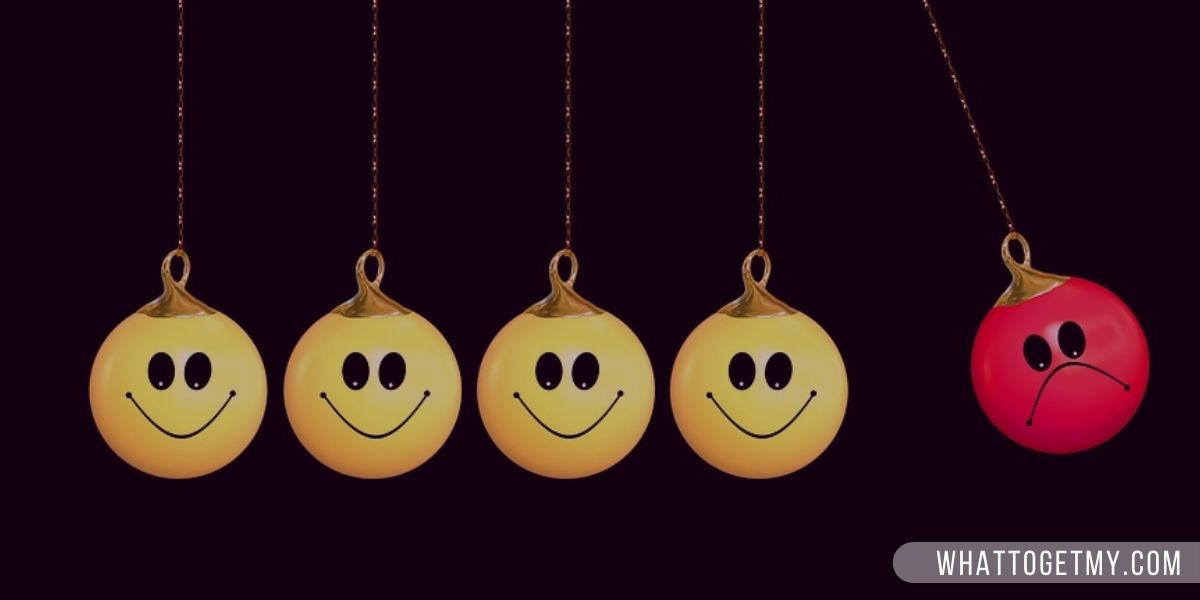 Caffeine can create dependency, so when you’re not consuming “enough” you’re in a bad mood. Once you drink your morning coffee, a sudden energy rush “improves” your mood for a while. It’s a dependency circle! If you want to avoid caffeine’s addictive qualities, you should completely cut it or at least limit the consumption.
Caffeine can create dependency, so when you’re not consuming “enough” you’re in a bad mood. Once you drink your morning coffee, a sudden energy rush “improves” your mood for a while. It’s a dependency circle! If you want to avoid caffeine’s addictive qualities, you should completely cut it or at least limit the consumption.
No headaches
 When you “skip” your morning coffee you’ll experience caffeine withdrawal with symptoms such as fatigue, difficulty concentrating, brain fog, etc. One of the most common side effects of caffeine withdrawal is a headache. If you don’t consume caffeine at all, you won’t have the problems with these symptoms altogether.
When you “skip” your morning coffee you’ll experience caffeine withdrawal with symptoms such as fatigue, difficulty concentrating, brain fog, etc. One of the most common side effects of caffeine withdrawal is a headache. If you don’t consume caffeine at all, you won’t have the problems with these symptoms altogether.
Better aging
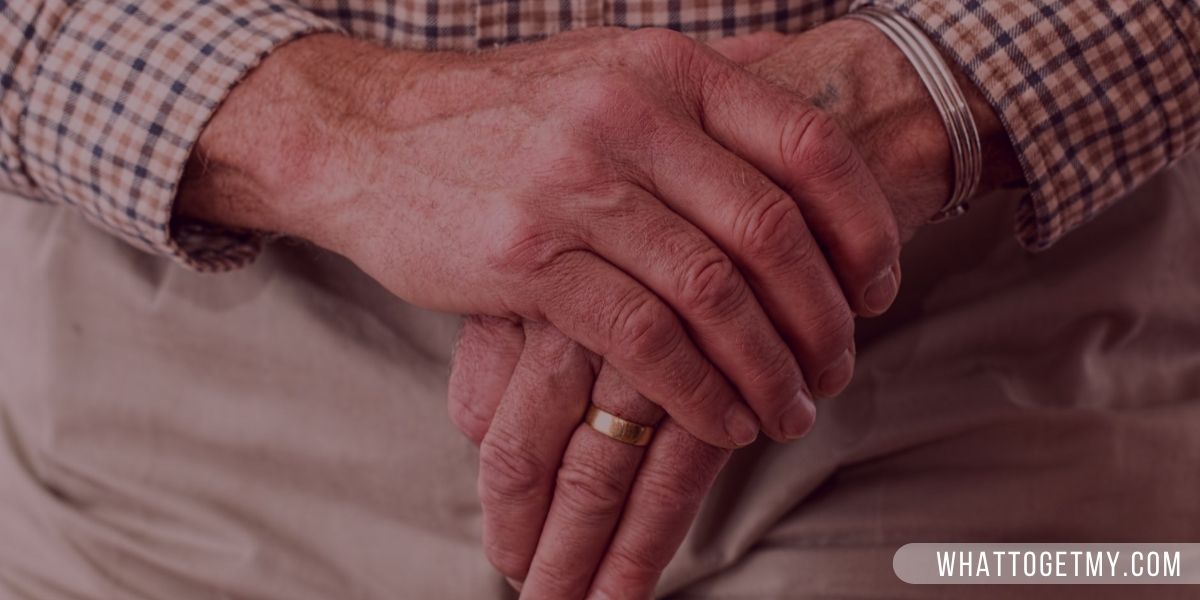 No caffeine, no wrinkles. Caffeine interferes with the formation of collagen, so you can keep your skin healthy and young if you stay away from caffeinated drinks.
No caffeine, no wrinkles. Caffeine interferes with the formation of collagen, so you can keep your skin healthy and young if you stay away from caffeinated drinks.
Caffeine-free alternatives
These are just some of the most common changes people that cut down on caffeine noticed. Now you’re probably wondering “what can I drink for energy instead of coffee”. Luckily, there are a lot of substitutes for coffee. We’ll give you some examples of healthy morning drinks to wake you up.
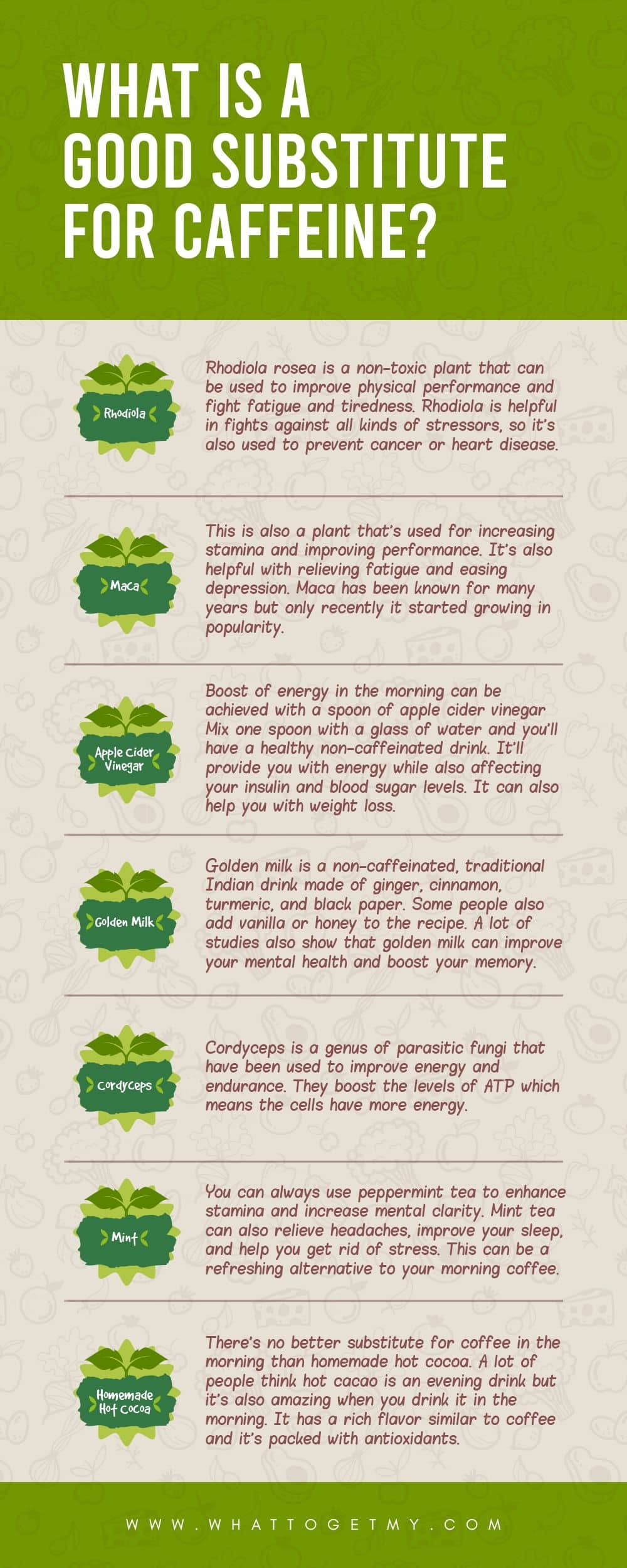
Use this graphic for free, just source us with this link:
Source Link: https://whattogetmy.com/what-is-good-substitute-for-caffeine/
Rhodiola
 Rhodiola rosea is a non-toxic plant that can be used to improve physical performance and fight fatigue and tiredness. You can get your energy and stamina boost by making a tea out of Rhodiola or taking it as a supplement (capsules, tablets, powder). Rhodiola is helpful in fights against all kinds of stressors, so it’s also used to prevent cancer or heart disease.
Rhodiola rosea is a non-toxic plant that can be used to improve physical performance and fight fatigue and tiredness. You can get your energy and stamina boost by making a tea out of Rhodiola or taking it as a supplement (capsules, tablets, powder). Rhodiola is helpful in fights against all kinds of stressors, so it’s also used to prevent cancer or heart disease.
Maca
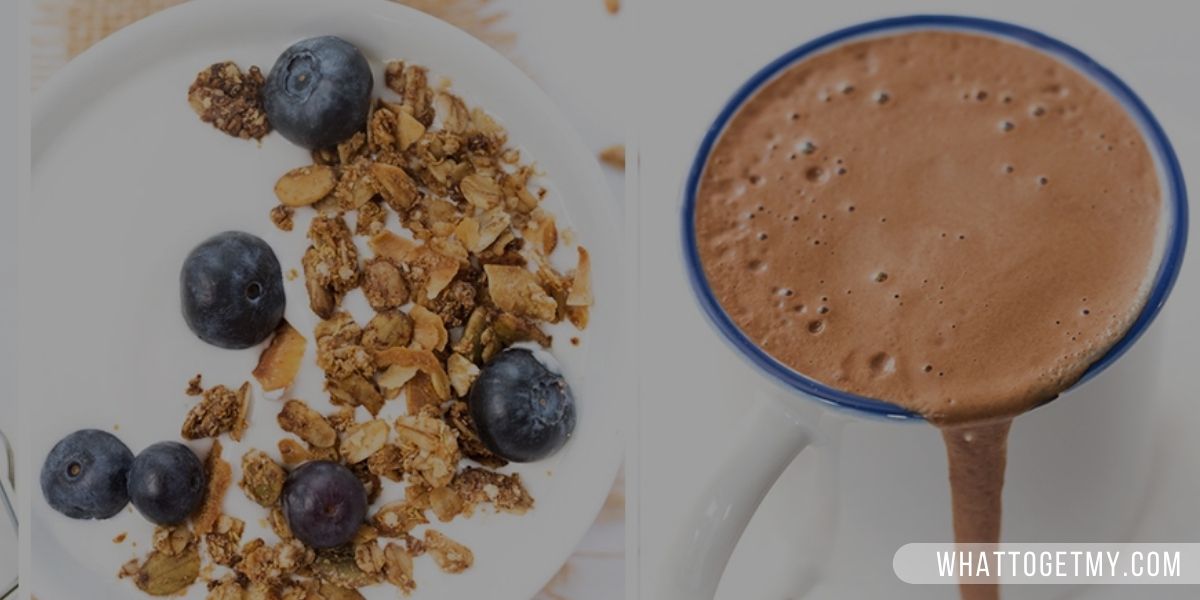 One more natural alternative to tea and coffee is maca. This is also a plant that’s used for increasing stamina and improving performance. It’s also helpful with relieving fatigue and easing depression. Maca has been known for many years but only recently it started growing in popularity. Everyone focused on maintaining a healthy diet uses maca powder (or capsules) as an addition to smoothies or hot milk.
One more natural alternative to tea and coffee is maca. This is also a plant that’s used for increasing stamina and improving performance. It’s also helpful with relieving fatigue and easing depression. Maca has been known for many years but only recently it started growing in popularity. Everyone focused on maintaining a healthy diet uses maca powder (or capsules) as an addition to smoothies or hot milk.
Apple Cider Vinegar
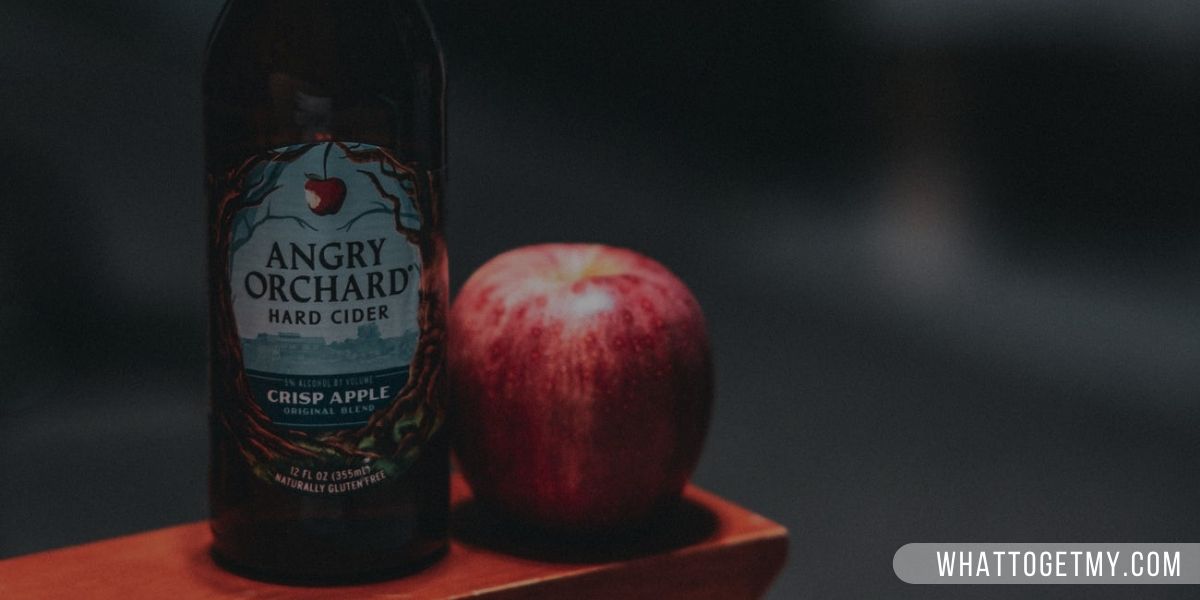 Boost of energy in the morning can be achieved with a spoon of apple cider vinegar. Mix one spoon with a glass of water and you’ll have a healthy non-caffeinated drink. It’ll provide you with energy while also affecting your insulin and blood sugar levels. It can also help you with weight loss.
Boost of energy in the morning can be achieved with a spoon of apple cider vinegar. Mix one spoon with a glass of water and you’ll have a healthy non-caffeinated drink. It’ll provide you with energy while also affecting your insulin and blood sugar levels. It can also help you with weight loss.
Golden Milk
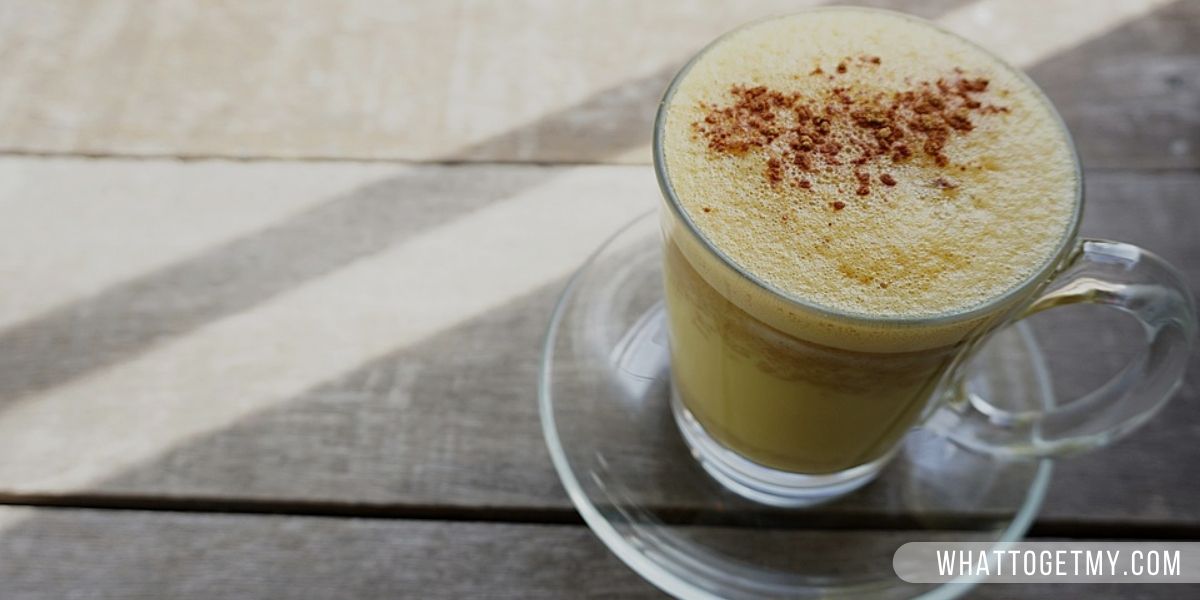 One of the healthy alternatives to tea and coffee is golden milk. People usually drink it at night but a lot of people say that if you drink it in the morning, it would keep you energized throughout the day. Golden milk is a non-caffeinated, traditional Indian drink made of ginger, cinnamon, turmeric, and black paper (besides milk of course). Some people also add vanilla or honey to the recipe.
One of the healthy alternatives to tea and coffee is golden milk. People usually drink it at night but a lot of people say that if you drink it in the morning, it would keep you energized throughout the day. Golden milk is a non-caffeinated, traditional Indian drink made of ginger, cinnamon, turmeric, and black paper (besides milk of course). Some people also add vanilla or honey to the recipe.
The ingredients of golden milk have anti-inflammatory properties as well as antioxidant, anti-arthritic, and anti-cancer benefits. A lot of studies also show that golden milk can improve your mental health and boost your memory.
Cordyceps
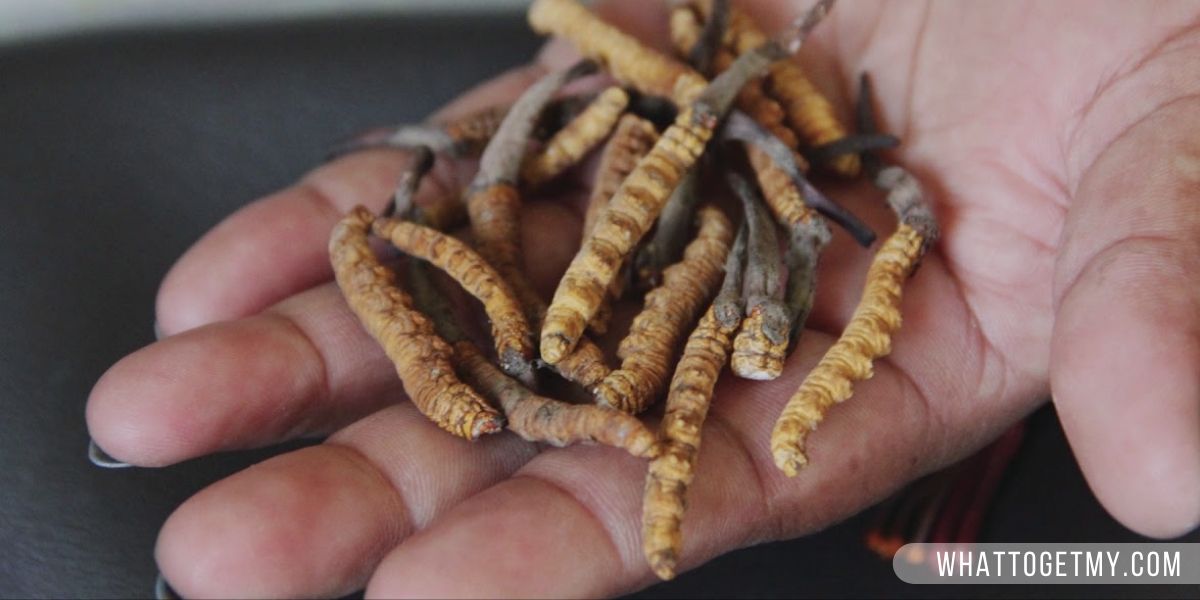 Cordyceps is a genus of parasitic fungi that have been used to improve energy and endurance. They boost the levels of ATP which means the cells have more energy. You can find cordyceps in capsules, tinctures, and powder that can be added to soups, smoothies, or tea. There is also a cordyceps powder mixed with coffee but if you’re trying to cut down coffee intake we suggest you add cordyceps supplements in smoothies or tea.
Cordyceps is a genus of parasitic fungi that have been used to improve energy and endurance. They boost the levels of ATP which means the cells have more energy. You can find cordyceps in capsules, tinctures, and powder that can be added to soups, smoothies, or tea. There is also a cordyceps powder mixed with coffee but if you’re trying to cut down coffee intake we suggest you add cordyceps supplements in smoothies or tea.
Mint
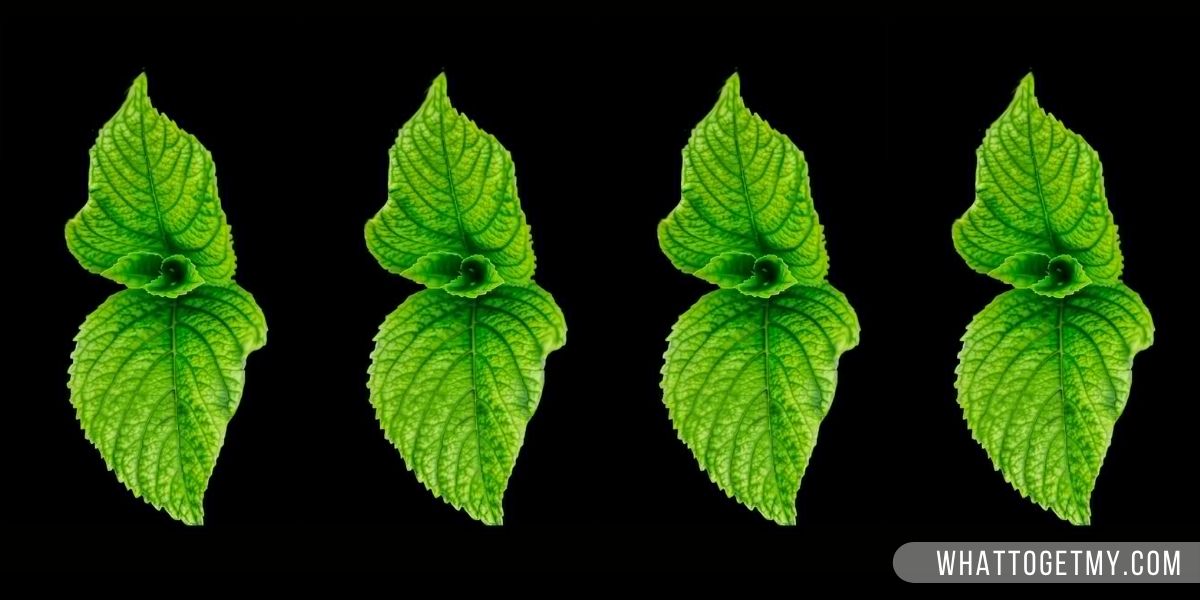 You can always use peppermint tea to enhance stamina and increase mental clarity. Mint tea can also relieve headaches, improve your sleep, and help you get rid of stress. This can be a refreshing alternative to your morning coffee. You can also use mint leaves to make healthy energizing smoothies such as this one in the video below.
You can always use peppermint tea to enhance stamina and increase mental clarity. Mint tea can also relieve headaches, improve your sleep, and help you get rid of stress. This can be a refreshing alternative to your morning coffee. You can also use mint leaves to make healthy energizing smoothies such as this one in the video below.
Homemade Hot Cocoa
 There’s no better substitute for coffee in the morning than homemade hot cocoa. A lot of people think hot cacao is an evening drink but it’s also amazing when you drink it in the morning. It has a rich flavor similar to coffee and it’s packed with antioxidants. We’re sure it will help you relax and improve your mood in the morning too.
There’s no better substitute for coffee in the morning than homemade hot cocoa. A lot of people think hot cacao is an evening drink but it’s also amazing when you drink it in the morning. It has a rich flavor similar to coffee and it’s packed with antioxidants. We’re sure it will help you relax and improve your mood in the morning too.
Diet changes for energy
If you give up on caffeine, your body can absorb nutrients better which means you can get additional energy from the minor changes of your diet.
Healthy carbs
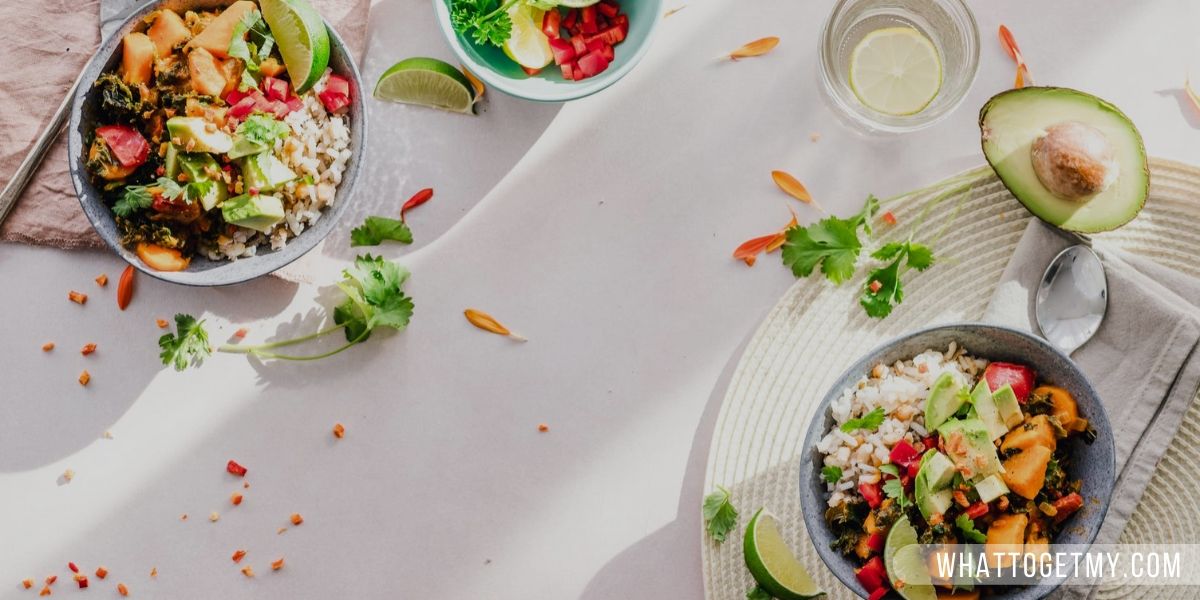 Try to increase consumption of complex carbohydrates like does found in bananas or oatmeal. You’ll get immediate energy while also storing these nutrients for later use. You can also try getting healthy sweet midday snacks like berries. They are wonderful for those that are looking for energy kicks from natural sugars. Also, the energy you’ll get from berries will last much longer than the regular “sugar rush” from processed sugar and candies.
Try to increase consumption of complex carbohydrates like does found in bananas or oatmeal. You’ll get immediate energy while also storing these nutrients for later use. You can also try getting healthy sweet midday snacks like berries. They are wonderful for those that are looking for energy kicks from natural sugars. Also, the energy you’ll get from berries will last much longer than the regular “sugar rush” from processed sugar and candies.
More proteins
 Proteins can boost your mood and increase your energy and concentration levels. That’s why everyone recommends having a handful of nuts by your side while studying. Walnuts, pistachios, almonds, or anything else you like should be a regular part of your diet. Also, if you want to remove caffeine from your mornings, have a protein-rich breakfast to get you going.
Proteins can boost your mood and increase your energy and concentration levels. That’s why everyone recommends having a handful of nuts by your side while studying. Walnuts, pistachios, almonds, or anything else you like should be a regular part of your diet. Also, if you want to remove caffeine from your mornings, have a protein-rich breakfast to get you going.
Boosting vitamins intake
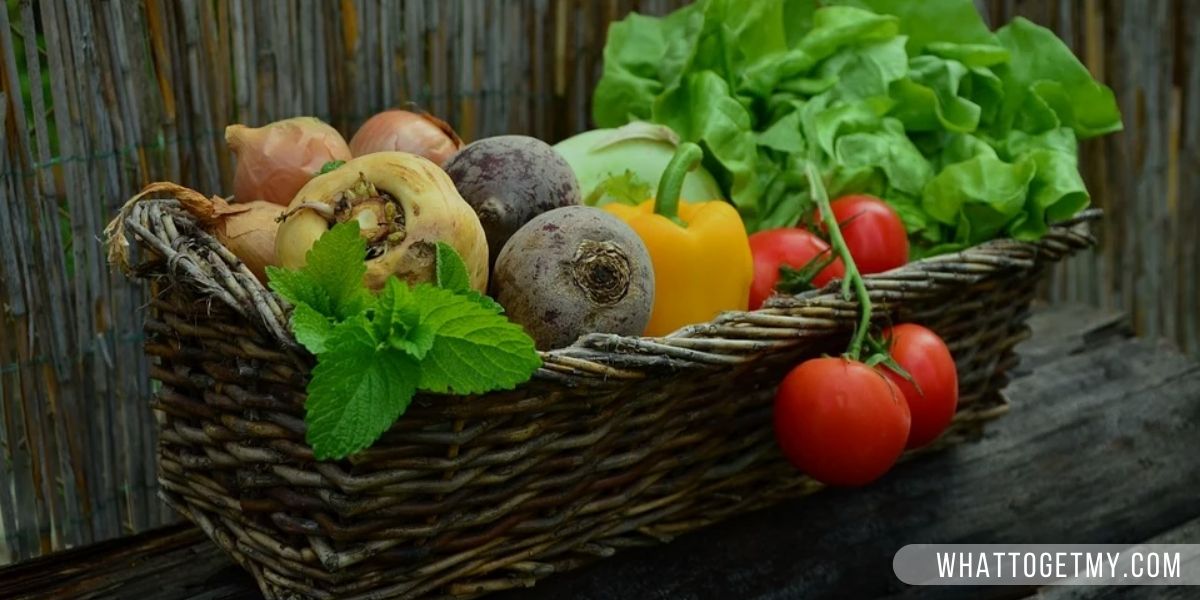 Vitamins and minerals have a huge role in energy production. For example, B vitamins help you metabolize the foods you eat, so a B vitamin deficiency can cause fatigue and inability to concentrate. You can get B vitamins with food such as lean meats, nuts, seeds, and eggs or with supplements. The same goes for other vitamins and minerals. Try to take them naturally as a part of your diet but if you can’t you can find quality supplements in your local pharmacy.
Vitamins and minerals have a huge role in energy production. For example, B vitamins help you metabolize the foods you eat, so a B vitamin deficiency can cause fatigue and inability to concentrate. You can get B vitamins with food such as lean meats, nuts, seeds, and eggs or with supplements. The same goes for other vitamins and minerals. Try to take them naturally as a part of your diet but if you can’t you can find quality supplements in your local pharmacy.
A lot of water
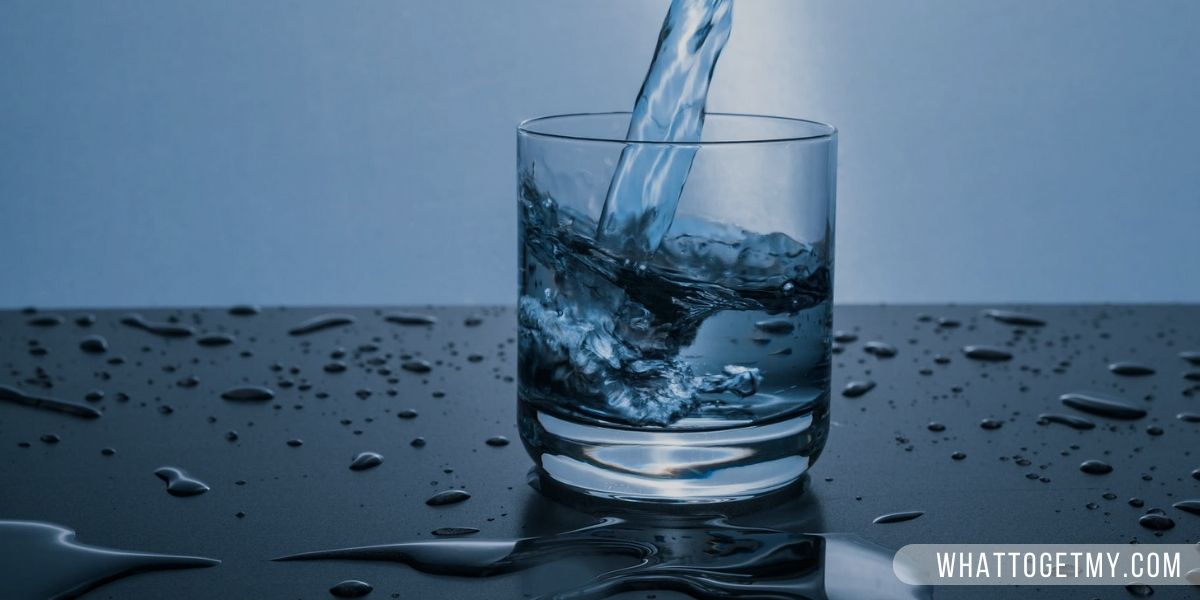 When you ask what is a good drink to replace coffee, not many people will answer water. However, increasing your water intake can help you stay hydrated which gives you an energy boost. You can drink a glass of water as soon as you wake up to see for yourself. You’ll beat the morning grogginess with ease.
When you ask what is a good drink to replace coffee, not many people will answer water. However, increasing your water intake can help you stay hydrated which gives you an energy boost. You can drink a glass of water as soon as you wake up to see for yourself. You’ll beat the morning grogginess with ease.
You can also try drinking coconut water once in a while. This drink is rich in electrolytes that help you combat weakness and fatigue. It’s a great replacement for energy and sports drinks.
Smoothies
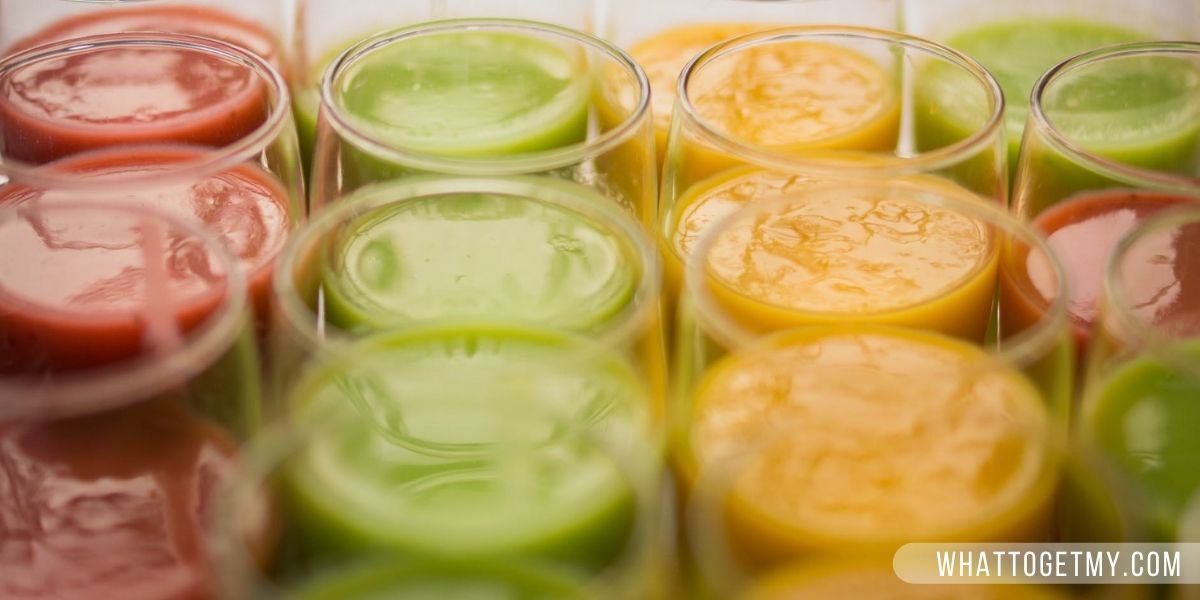 We already mentioned some of the ingredients you can add to make your smoothie a real energy bomb. Nonetheless, smoothies are great on their own because they’re rich in proteins, carbohydrates, fiber, and antioxidants. The more various fruits and veggies you use, the better!
We already mentioned some of the ingredients you can add to make your smoothie a real energy bomb. Nonetheless, smoothies are great on their own because they’re rich in proteins, carbohydrates, fiber, and antioxidants. The more various fruits and veggies you use, the better!
Coffee alternatives with much less caffeine
Ginseng
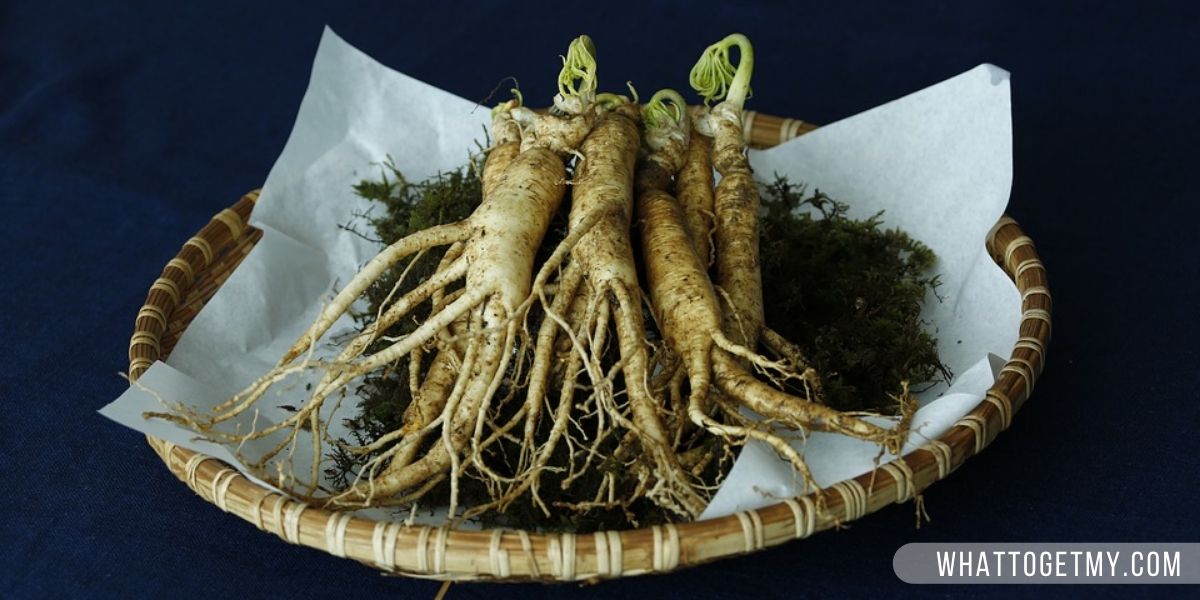 If you’re looking for herbal tea that tastes like coffee, you might want to try ginseng tea. It has natural caffeine but it works by increasing the production of ATP. Ginseng can enhance mental energy, memory, and attention span. It’s also good for improving mood and performance.
If you’re looking for herbal tea that tastes like coffee, you might want to try ginseng tea. It has natural caffeine but it works by increasing the production of ATP. Ginseng can enhance mental energy, memory, and attention span. It’s also good for improving mood and performance.
Kombucha
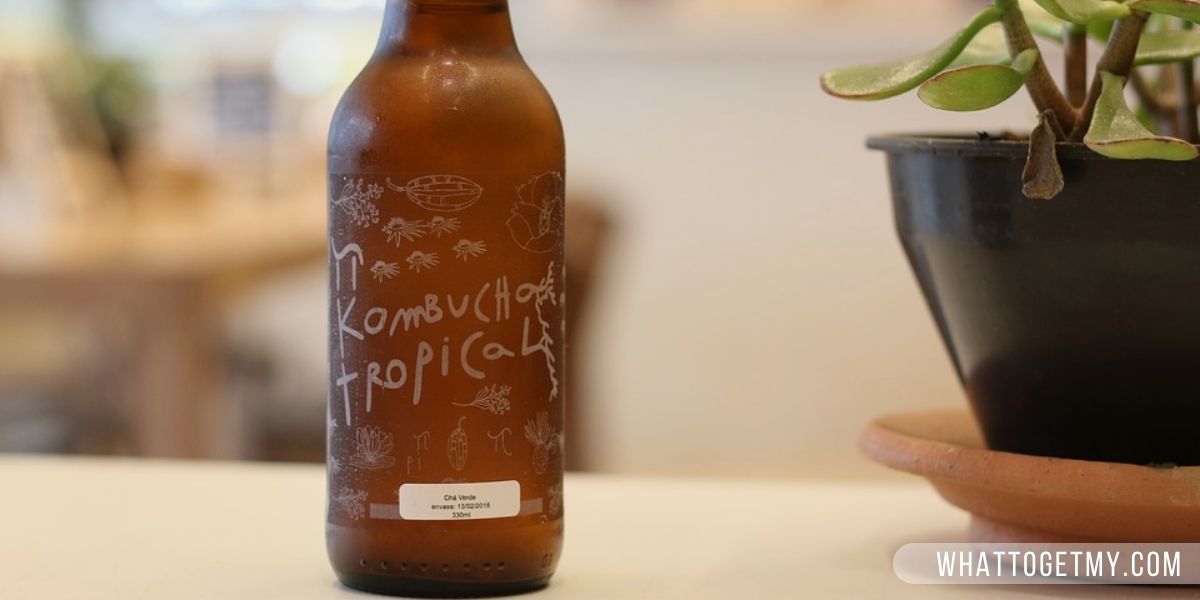 For people who want a drink with less caffeine that still gives a gentle caffeine boost, kombucha is the thing. Kombucha is a sweet tea that’s brewed from black or green tea, so it has some extent of caffeine. It’s also filled with vitamin B, so you can boost your immune system too.
For people who want a drink with less caffeine that still gives a gentle caffeine boost, kombucha is the thing. Kombucha is a sweet tea that’s brewed from black or green tea, so it has some extent of caffeine. It’s also filled with vitamin B, so you can boost your immune system too.
Frequently asked questions
Who should avoid caffeine?
Some people need to avoid low sugar caffeine drinks more than others. If you’re prone to anxiety or have digestive conditions (acid reflux, diabetes, etc.) you should stay away from caffeinated drinks.
How can I wake up without caffeine?
There are lots of ways to wake up early but it’s crucial to have enough sleep hours. Try sleeping with open blinds, so you can be woken up by the sunshine. You can also drink a glass of water or fresh juice as soon as you wake up.
Conclusion
We hope that this article answered your question on what is a good substitute for caffeine. Having good alternatives is crucial if you want to cut caffeine out of your life. However, if you want to enjoy an occasional cup of coffee, you don’t have to beat yourself up about it. One or two cups a week won’t have a huge impact on your health because it’s all about moderation. With a balanced diet, you won’t have problems with blood pressure, fatigue, weakness, concentration, or insomnia.
Keep researching and stay informed so you can help yourself and others. If you know someone who has trouble sleeping, you can also give a gift to help.
01 HOUR 24 MINUTES
ESTIMATED TIME DESIGNING AND UPLOADING THIS ARTICLE
07 HOURS 12 MINUTES
ESTIMATED TIME RESEARCHING AND WRITING THIS ARTICLE
You Might Also Like

